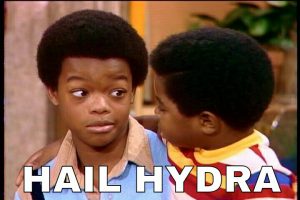
Paul Kinsey’s Very Bad, Super No-Good Life
Since this blog has become a receptacle for posts about Mad Men and other so-called “peak TV” shows plus a smattering of self-promotion posts about my own writing … let’s lean into it.
There’s often a sense that old TV shows should be buried and forgotten, as if there’s shame in discussing a show like Mad Men a certain time after it’s ended. Hell, we still discuss novels written centuries ago, so why not a TV show that’s less than a few years gone? But when we talk about Mad Men—and, remarkably, we still do, an awful lot—there’s a tendency to focus on the flashy main characters, naturally enough. But we have enough essays about Don Draper, I think. As writers, we tend to focus on Don, because he’s so obviously like us: Creative, tortured, stymied by the very instruments of his success.
Forget Don, though, and let’s contemplate a character that doesn’t get much attention in any serious way: Paul Kinsey. Because, writers, in many ways Paul Kinsey is us.
The Failed Writer
Kinsey doesn’t get a ton of screen time on the show, and what he does get is used mainly for comic relief, but as usual Weiner and company shade the character with plenty of good writing. We know, for example, that Paul is from New Jersey and attended Princeton on a scholarship, where he lost his joisoy accent and learned how to dress and talk and fondle a pipe like his richer classmates. At the beginning of the series, he’s one of a group of young men at the firm, all of whom are more or less equal despite being in different departments. He’s a copy writer, though, while his peers are in accounts.
And Paul is not talented. What he’s good at is superficial mimicry, which is why he does well enough at first when his immediate boss is the alcoholic and incompetent Freddie Rumsen. But Paul is weak and likes to think of himself as smarter than everyone else, so he dabbles. He dabbles in the Beatnik movement, the Hippie movement, the Civil Rights movement. He feigns an appreciation of the finer things, but he uses this appreciation as an excuse to let everyone know how worldly he is.
Paul is increasingly aware that something is off. Late in Season 1, a play he wrote is discovered in his desk and his co-workers stage it as a drunken, cruel prank. Paul eventually leans into it, directing the play with enthusiasm, but it’s clear the play is terrible. Meanwhile, Ken Cosgrove actually publishes short stories in real magazines, and slowly Paul sees his peers outpacing him. Pete and Ken and even despicable, harebrained Harry Crane move up the food chain, making more money and gaining status. Paul remains a Copy Writer, and not a very good one.
And then, in the middle of Season Three of the show, Paul Kinsey has an epiphany and realizes he is not a good writer. Because Peggy Olson is a good writer, and you can almost pinpoint the moment he realizes he’s not one to episode 10, The Color Blue. In that episode Peggy and Paul compete to come up with the best idea for a telegram advertisement. Peggy does the work studiously, and doesn’t come up with much of any value. Paul drinks, masturbates, and has a flash of inspiration–which he forgets to write down. We’ll never know if that idea was actually any good, because Paul shambles into the meeting later with nothing—and watches, stunned, as Peggy takes a throwaway line he used to explain his problem and runs with it, producing a decent if not world-changing concept on the spot.
At that moment, Paul knows he’s mediocre. In episode 13, when Don and the rest of the executives steal all the accounts and form a new company, Don personally recruits Peggy. No one recruits Paul. When Paul realizes this, its confirmed: He’s not good at his job.
The Downward Spiral
We don’t see Paul again until Season 5, when he appears as a member of the Hare Krishna’s, looking ridiculous and pathetic and lost with a shaved head. Like most failed writers, he hasn’t given up on his dream. Like anyone who has ever been voted off a talent competition show, he has decided that we haven’t heard the last of him, so he’s still writing.
Paul’s spec script for Star Trek is the sort of awful SFF idea that still gets written every few weeks by flailing writers, the sort of terrible idea that will always be written by flailing writers. Worst of all, Paul seems to know that he doesn’t have talent, as he has pinned his hopes on Harry’s TV connections to get the script considered. Paul has descended to a low point: No longer in the ad business, he’s not even getting paid for his second-rate creativity. He’s got nothing, and yet he’s still plodding away at terrible stories.
That could be any one of us. Even if you’ve published, and published widely, you can’t be certain it’s not just luck, that history will slowly rub your face out of the picture until no one is quite sure who you are, and no one remembers the stories you told. In just 40 episodes and probably a collective hour’s worth of screen time, the writers of Mad Men made Paul Kinsey into a well-shaded, sad individual, and he ought to be the patron saint of anyone who joined their high school literary magazine and thought they were special because they wrote stories.









